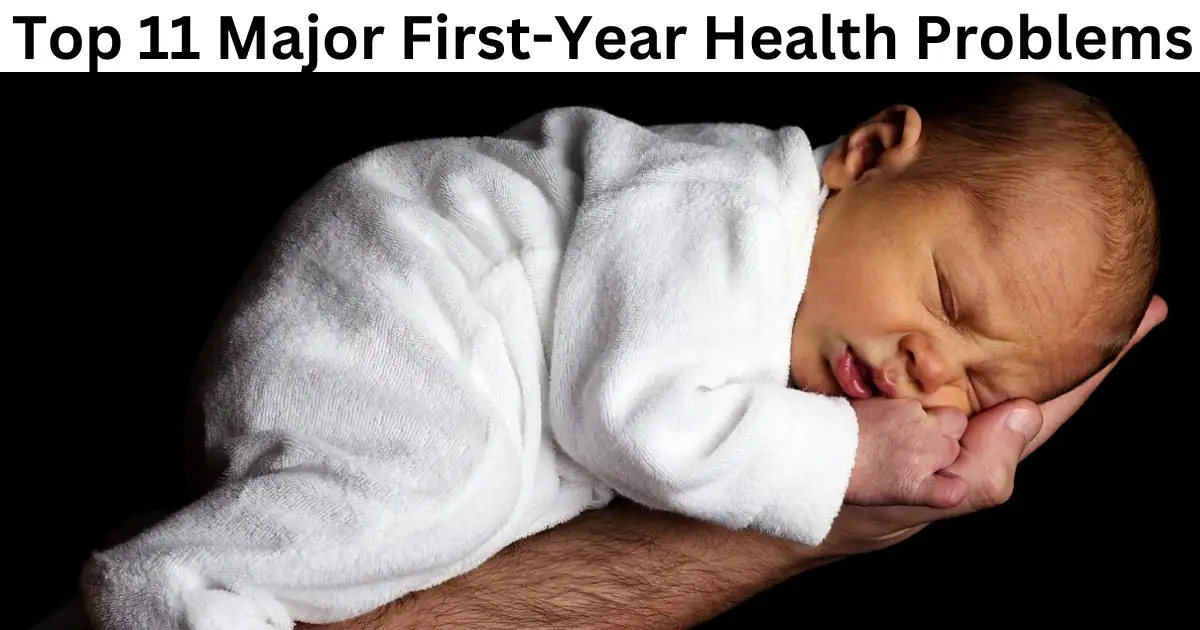Navigating the first year of your baby’s life can be challenging, with several common health issues that may arise. Understanding the top 11 major first-year health problems for 1st year babies is crucial for new parents. These issues include colic, diaper rash, fever, ear infections, respiratory infections, teething, jaundice, thrush, gastroenteritis, allergies, and immunization reactions. By recognizing these health problems early and knowing how to address them, parents can ensure their baby’s well-being and development throughout this critical period.
1) Autism – The autistic child lives in a world of her own, and does not respond normally to parental love or to the world around her. Treatment is by psychological and occupational therapy.
2) Blue Baby – This is the name given to a baby whose lips and skin have a blue tinge as a result of a heart defect at birth. This prevents some of the baby’s blood getting the oxygen that gives blood its normal bright red colour. The blueness is not always present immediately after birth, but the baby will grow more slowly and tire more easily than a normal child. Because it is easily detectable, the condition can be normally corrected by surgery before any permanent damage is done.
3) Cerebral palsy – Damage to the brain either during or after birth, can cause cerebral palsy or spastic paralysis. It is a disorder of movement and posture. Although the child may show some symptoms in the early days, it is not usually detected until the fifth or sixth month.
4) Cleft Palate – A small cleft at the back of the palate, or roof of the mouth, is not serious and requires no treatment. Where the cleft extends from the back of the palate to the front, it may include a cleft of the upper lip. Both can be treated surgically and in both cases, results are extremely good.
5) Cot Death – About 2,000 babies are found expectedly dead in their cots each year, usually during the winters. Tests have shown that most of these babies are killed by unsuspected virus pneumonia.
Cot death are most common in babies under a year old. Bottle-fed babies are more likely to die than those that are breast-fed. Usually, it is found that the babies who die have been ill for a day or two with a respiratory infection. Parents of newly-born babies should never hesitate to call the doctor if they are worried.
6) Gastroenteritis – This is a serious condition in babies and should have immediate medical attention. Gastroenteritis is an infection which is transmitted to the baby via his food usually because his feeding utensils have not been kept hygienically. It cannot be stressed enough that high standards of cleanliness must be observed when dealing with babies.
Acute gastroenteritis can develop from a mild tummy upset. Vomiting and frequent, loose and watery stools are followed by dehydration. Medical aid must be sought immediately.
7) Meningitis – Although not a birth disorder, meningitis is a serious disorder which must be treated at once. It is caused by inflammation of the membranes covering the brain and spinal cord and can lead to brain damage. Early symptoms Are vomiting and high fever. The child may also whimper and go stiff when picked up.
8) Phenylketonuria – This Rare disease arises from a defect in the way the body uses phenylalanine, a constituent of protein in food. This abnormal process produces poisonous that harm the baby’s nervous system and brain. These substances can be prevented from forming by putting the infant on a diet containing proteins from which most of the phenylalanine has been removed.
9) Prematurity – A baby is considered to be premature if it weighs less than 2.5 kg. When it is born. All maternity hospitals are equipped with a premature – baby unit where the baby’s progress can be watched carefully. If the baby is too small, it will be placed in an incubator, a transparent box which keeps the baby warm while it is being observed.
The baby is not allowed home until it has reached the weight of 2.5 kg. and even then special care is still needed. The baby’s room must be kept warm and the baby must be protected from contact with people infected with a cold, sore throat or cough.
10) Rhesus disease – Most people have a substance in their blood called the rhesus factor, and are said to be rhesus positive. Those without this factor are rhesus negative. If a Rhesus – negative mother has rhesus – positive babies in her second and subsequent pregnancies, the babies blood cells may be destroyed by antibodies in the mother’s blood.
The condition can now be prevented by treating the mother with antibodies, given shortly after the birth of the first child and each subsequent child.
11) Spina bifida – The cause of spina bifida is not known, although it can be inherited. The condition is a malformation of the spine which leaves the spinal cord unprotected. The type and severity of the condition varies and mild cases can benefit from surgery if carried out in the first days of birth.
Severe cases may lead to hydrocephalus, excessive fluid in and around the brain. This sometimes be treated by an operation.
